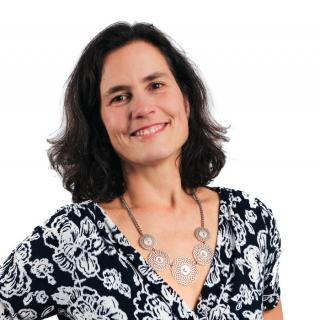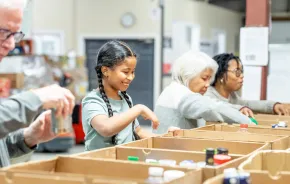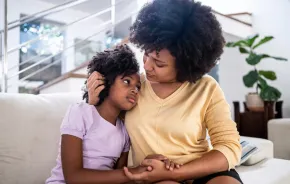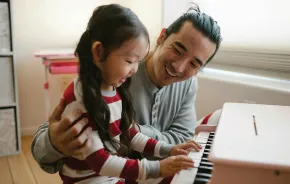
Sarah Ioannides, the celebrated new music director of the Tacoma Symphony Orchestra (TSO), has won accolade after accolade for her conducting talent and innovation in a field still dominated by men.
Her inaugural season with TSO, meanwhile, is selling out concerts and earning rave reviews. Ioannides, who was born in Canberra, Australia, is also music director of the Spartanburg Philharmonic Orchestra in South Carolina. She is mother to three young children and is married to Yale professor of trombone Scott Hartman.
How did your early interest in music start?
I was exposed to music from the very beginning: When my mother was pregnant with me, she was attending concerts and singing in a choir that my father conducted. So I suppose that spark was always there and somewhat inherited; I come from a long line of musicians. My first instrument was piano; then, violin. By the age of 8, I was playing three instruments, violin, piano and recorder.
How did you develop a passion for conducting?
My father, Ayis Ioannides, is a conductor so I grew up with an immediate conducting role model. When I was younger and still living in the United Kingdom, I won a place as a violinist in the National Youth Orchestra as well as the National Youth Chamber Orchestra. In both of these orchestras I was introduced to internationally renowned conductors and that’s when I was first inspired to start studying conducting. I was also quite interested in the psychology of musicians and what makes them do certain things.
What are your plans for TSO and its community and family programs?
My first goal is to draw a passionate following for the symphony and live orchestral music; part of that will be community engagement and reaching out to different pockets in Tacoma. We hope to bring groups of musicians out in the community and performing across the region, and to really have our performances be top quality and follow wonderful guest artists. In addition we are doing some new things; like the world premiere of a percussion orchestra [Ioannides’ inaugural concert featured a world premiere of a percussion concerto by Sean O’Boyle].
[As far as programming specifically for children] the Mini Maestros concerts are performed by a chamber orchestra group of four–five players. It’s a wonderful program. We want to offer children’s performances more often and would like to have more story repertoire on a regular basis. We would love to hear from readers on what they’d like to see.
Being exposed to music and live music and performance is a whole other world that can be so enriching and that can show [kids] the greater world out there.
What are some upcoming highlights of the Tacoma Symphony Orchestra’s season?
In May, we’re doing a multimedia show called “The Planets”; it will be played with photographs, imagery and film from the Hubble telescope. It will be very exciting.
We also have our pops concert on March 22, “Songs from the Emerald Isle,” with a piece by a friend of mine [“Tour de Tap,” a concerto for orchestra and tap dancer by composer Kim Schamberg] and featuring a Tony Award–winning tap dancer [Trent Kowalik] and guest vocalist Kaitlyn Lusk, who was chosen to be the singer for Lord of the Rings.
How do you support your children’s musical development?
We have three children, ages 4, 4 and 7: two girls and one boy. The girls play violin and piano. Our little boy is playing ukulele. He wanted to do something that was his own thing. They have lessons once a week, and often do lessons by Skype.
How do you keep up music lessons and practice amid all the transitions?
You have to commit to it. If the parent commits, the child commits. The sessions don’t have to be long. Do a little bit at a time, small bites, regularly.
They might not want to do it every day, but there are the days when they are very pleased with it and realize practice is making them better.
What helps you juggle such an extraordinary career with raising small children?
We have to do an immense amount of preplanning because we go away so often. My 7-year-old daughter goes to school in South Carolina, Connecticut and Tacoma. The twins are in school in two places. The way we survive is we have a wonderful au pair, who is German.
Also, getting enough sleep is really important, staying healthy, making sure we’ve all got stress-relieving activities. Inevitably, something has got to give. In the end, it doesn’t matter, as long as you’re keeping up with really important stuff.
Anything else you’d like to share with readers?
Being exposed to music and live music and performance is a whole other world that can be so enriching and that can show [kids] the greater world out there. Set aside some time and resources and savings for that. We are such a world obsessed by things, but I think what we do is more important than what we’ve got.











